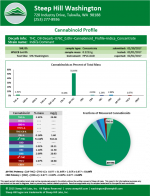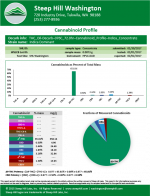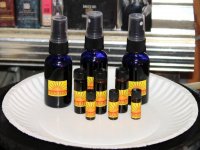Hopefully this is interesting and perhaps useful to add to the forum.
Many posts on here worry about overcooking Cannabis-oil thinking that a significant portion of THC oxidizes to CBN.
THC actually seems to me to be a fairly robust compound, from some testing results that I've obtained recently.
Recently I had been able to obtain some decent, mid-grade indica at a reasonable price, and then extracted the Cannabis-oil into a concentrate to use for oil dabs, in edibles, etc.
Once the extract was purged, I heated it in an 'double-bath' arrangement in a fondue cooker to precisely control the heat applied in a narrow range of 4°-5°C, for an extended period of time. I used a digital thermometer inserted into the oil-bath to monitor the temperature fairly precisely, and in a controlled manner.
Here are the test results from a certified test lab (in Washington State) for decarbing for 8 hours at 122°C (248°F).
CANNABINOID PRE-decarb POST-decarb %CHANGE
THC 71.91% 79.15% +7.24%
CBN 0.69% 1.09% +0.50%
CBC 0.88% 1.02% +0.16%
CBG 1.51% 1.96% +0.45%
THCV 0.37% 0.36% -0.01%
Very Interesting results after 8 hours of cooking —> THC and other active cannabinoids have increased during the extended heating cycle.
=>> THC has increased significantly during the process, while at the same time CBN barely crept up, so fears here appear to be overblown.
Many posts on here worry about overcooking Cannabis-oil thinking that a significant portion of THC oxidizes to CBN.
THC actually seems to me to be a fairly robust compound, from some testing results that I've obtained recently.
Recently I had been able to obtain some decent, mid-grade indica at a reasonable price, and then extracted the Cannabis-oil into a concentrate to use for oil dabs, in edibles, etc.
Once the extract was purged, I heated it in an 'double-bath' arrangement in a fondue cooker to precisely control the heat applied in a narrow range of 4°-5°C, for an extended period of time. I used a digital thermometer inserted into the oil-bath to monitor the temperature fairly precisely, and in a controlled manner.
Here are the test results from a certified test lab (in Washington State) for decarbing for 8 hours at 122°C (248°F).
CANNABINOID PRE-decarb POST-decarb %CHANGE
THC 71.91% 79.15% +7.24%
CBN 0.69% 1.09% +0.50%
CBC 0.88% 1.02% +0.16%
CBG 1.51% 1.96% +0.45%
THCV 0.37% 0.36% -0.01%
Very Interesting results after 8 hours of cooking —> THC and other active cannabinoids have increased during the extended heating cycle.
=>> THC has increased significantly during the process, while at the same time CBN barely crept up, so fears here appear to be overblown.

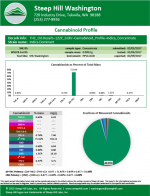
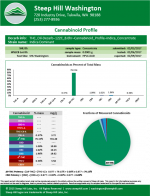
 appreciate the effort & the results
appreciate the effort & the results